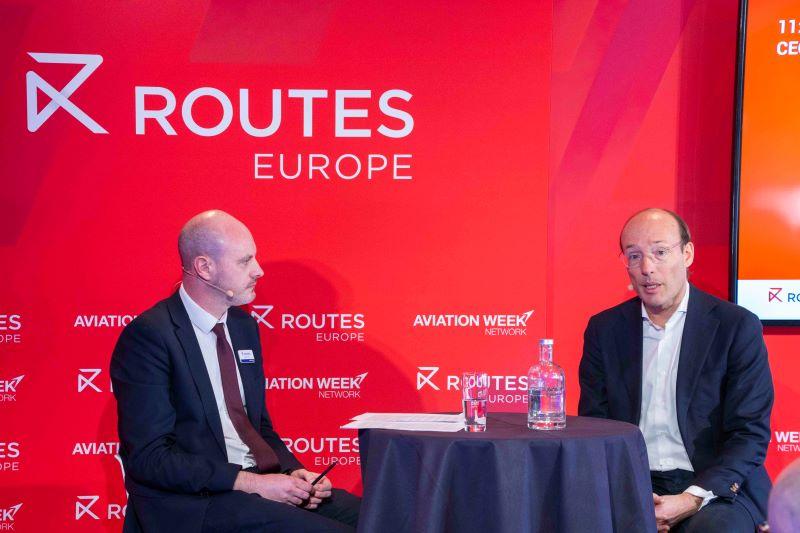SAS CEO: Air France-KLM Equity Stake Unlikely To Trigger Slot Remedies

(on right) SAS CEO Anko van der Werff
Scandinavian Airlines (SAS) CEO Anko van der Werff believes that Air France-KLM’s 19.9% equity investment will trigger some EU competition remedies, but he sees “no reason” why this would include surrendering slots.
As part of the SAS Forward restructuring plan, SAS has secured investment from a consortium including Air France-KLM and the Danish state, acting together with investment firms Castlelake and Lind Invest. The consortium plans to invest $1.2 billion in SAS in exchange for Air France-KLM’s 19.9% stake and move the airline from the Star Alliance to SkyTeam.
During a keynote interview at Routes Europe in Aarhus, Van der Werff was asked whether he expects any EU remedies for the Air France-KLM deal to be approved. “I think that there will be petitions [for competition remedies],” van der Werff replied. “I do expect it to be something, but not on slots.”
When quizzed on whether Air France-KLM was likely to raise its stake beyond 19.9%. Van der Werff said this is unlikely within the first two years. “First of all, we have to close this deal,” he said.
EU approval for the equity raise and completion of SAS’ Swedish court-led restructuring are the two major hurdles before SAS completes its U.S. Chapter 11 restructuring, which began in summer 2022.
“It’s painful to realize it’s only been two years; it feels like 20,” van der Werff said. “We are within spitting distance of emerging.”
Everything is on track for the court processes to be completed by July 1, but it is hard to predict the timelines for the EU approval. Normally a Chapter 11 restructuring takes 12-15 months but van der Werff said guiding government shareholders through a court-led restructuring in a different jurisdiction extended the timeline by nine to 12 months.
More News And Analysis From Routes Europe 2024
Reflecting on SAS’ historic position, van der Werff said the airline’s balance sheet was “literally just unsustainable” and the summer 2022 pilots’ strike was the final straw that pushed SAS into Chapter 11. He added that SAS should have gone into Chapter 11 in 2020, when many other airlines took the opportunity to restructure.
“It took us, I think, a very long time,” he said. “It’s not comfortable, it’s not easy to take these decisions, especially when you don’t take them when you should have done, which was 2020. That was the logical moment—when the entire industry went in. That was the moment to do it. So, when I arrived in 2021, there was a reluctance—a hesitation—to do anything.”





